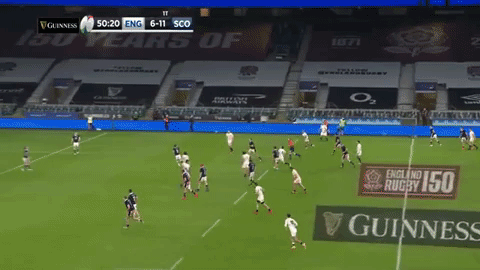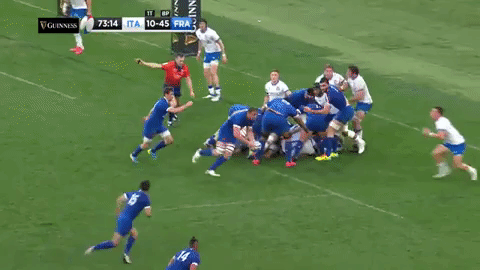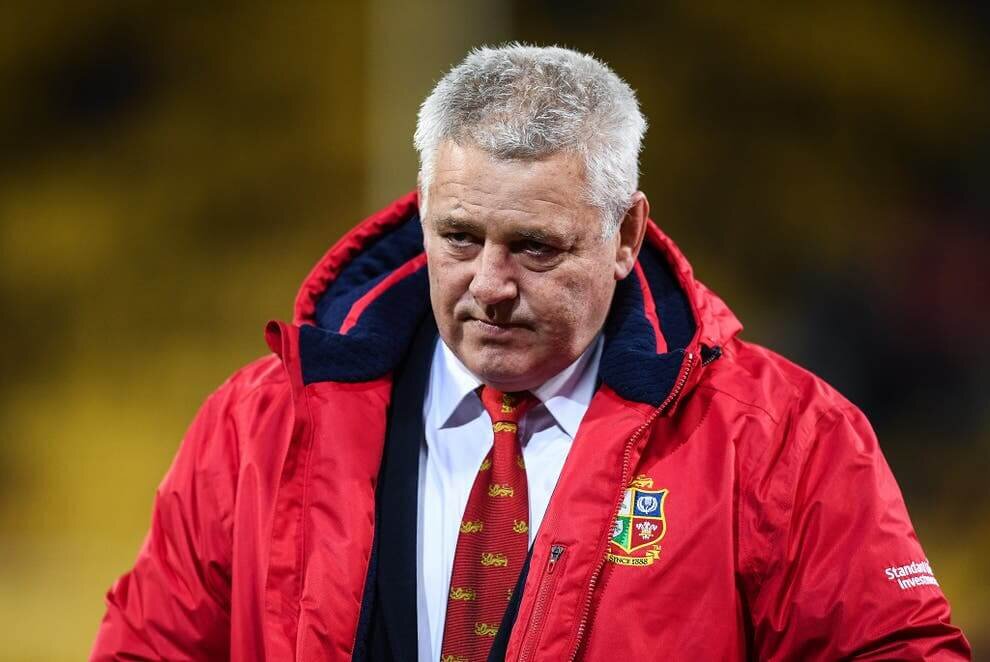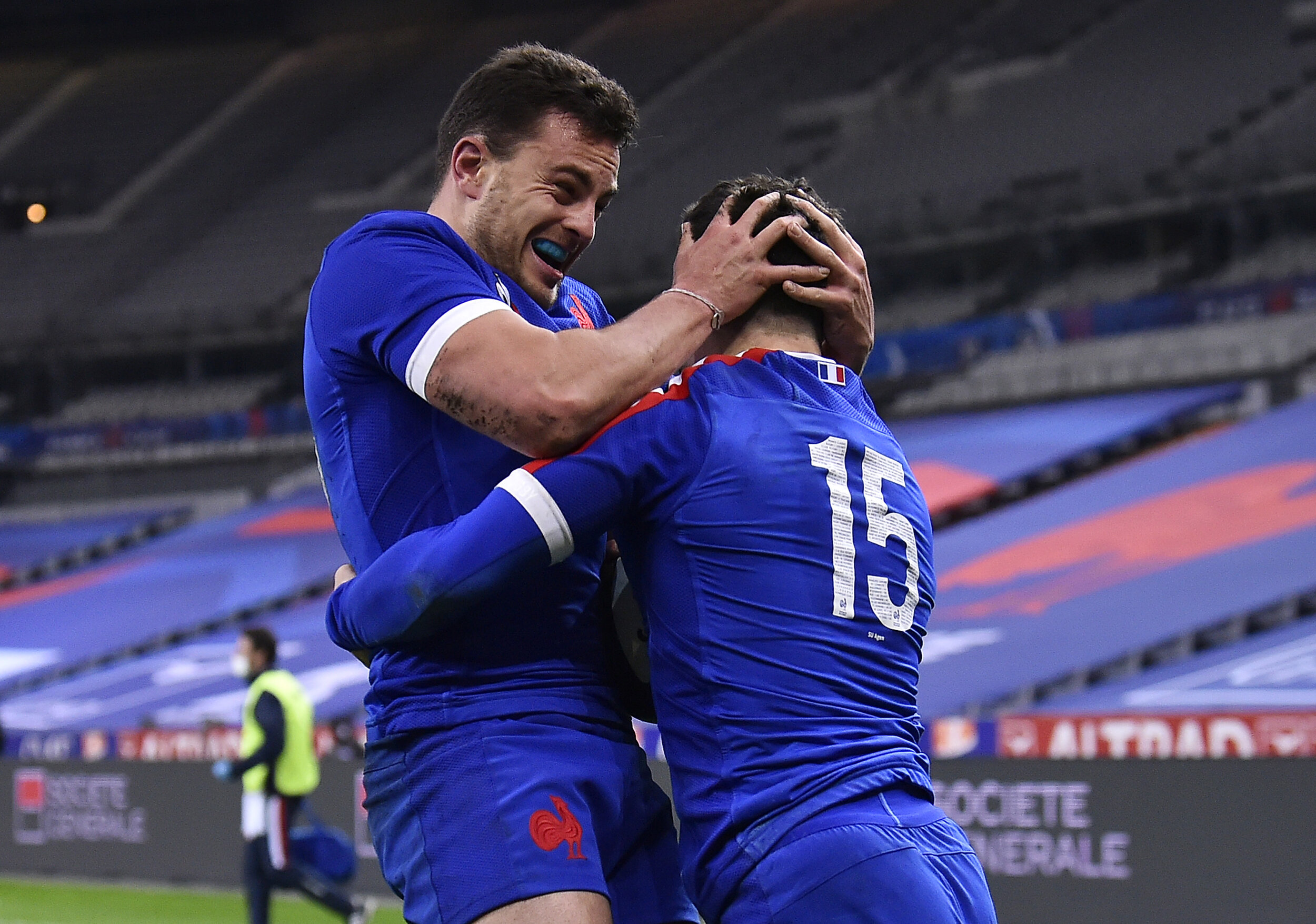Six Nations 2021: Six Talking Points from Round 1
Scotland celebrate their first Calcutta Cup win at Twickenham since 1983
Credit: Andrew Fosker/INPHO
It is safe to say that after the opening round of the 2021 Six Nations the cat is not only among the pigeons but they are all now good friends and debating moving in together.
Although we were treated to a majestic performance from Antoine Dupont, the weekend got off to a fairly predictable start as France steamrolled Italy 50-10 in Rome to shoot straight to the top of the standings.
Fast forward to Twickenham and Scotland shocked the rugby world by breaking down the English fortress to secure a stunning 11-6 victory over a lacklustre Red Rose.
The Scots now look genuine title contenders after overcoming their biggest challenge in their first game of the tournament while England are left with serious questions to answer going into next weeks game against Italy.
On Sunday, Ireland were reduced to 14 men early on as Peter O’Mahony was sent off early on for a reckless clearout in their game against Wales in Cardiff.
The Irishmen stubbornly refused to go away before ultimately losing 21-16 to hand Wales a much-needed victory.
After we all catch our breath from some gripping rugby, here are the key takeaways from Round 1.
Eddie Jones burnout or are England undercooked
Much like a Jose Mourinho third season - it is now becoming a question of how long Eddie Jones’ relentless methods lose their effect and players simply become jaded by the constant pressure.
In his book The Hurt, Dylan Hartley said he felt “anxiety” about reporting for England duty with Jones prone to physical and mental beasting of players in his pursuit of perfection.
After a mediocre Autumn Nations Cup campaign in terms of performance, should questions be asked of Jones’ leadership?
Jones played under the infamous Australian Bob Dwyer (nicknamed “barbed wire” for obvious reasons) at Randwick during the 1980’s - but does the modern player require a different type of coach?
Extract from former England captain Dylan Hartley’s autobiography “The Hurt”
Credit: Dylan Hartley/Mike Calvin
The impact of the COVID-19 pandemic cannot be underplayed - with players in a 24/7 bubble during the tournament will, understandably, have a knock-on effect on their mental health as they are separated from their families and confined to Pennyhill Park.
Instead of galvanising his troops into peak performance, it is not hard to imagine that Jones’ methods in this environment could leave the players worried, fearful and downcast as the rain poured down in West London.
On Saturday at Twickenham, England was powerless to resist a super Scotland who fully deserved their victory.
It could have been worse had the English defence not held up well against Scottish pressure with - making over 70 more tackles than their counterparts during the game.
The kicking was aimless whereas Scotland’s was tactical and precise. It looked as if England lacked ideas about how to get into scoring positions, kicking the ball from hand repeatedly and making half the carries that Scotland did.
Owen Farrell’s future going forward must lie at 12. He is not the young tearaway fly-half that burst onto the scene at 18, with his ability as a secondary playmaker outside someone such as Jacob Umaga or Marcus Smith the way forward for him as he approaches 30.
They lost the territory and position battle as a result - only enjoying a measly 35% of the ball - with England looking paralysed as the game started to slip away from them.
Poor decisions were made as they resorted to familiar tactics rather than thinking about how to turn the tide.
England were left with no answer to the relentless Scotland pressure
Credit: Andrew Fosker INPHO.jpg
England had 11 clean breaks compared to Scotlands 29 as the men north of the border enjoyed total dominance in open play which leads to questions about preparation, leadership and fitness.
It’s been well documented that the majority of the Saracens guys in the starting XV had not played a competitive game for two months (apart from a runout from Billy Vunipola in a friendly against Ealing)
Jones kept the faith with his wolfpack contingent and Owen Farrell, Billy Vunipola, Jamie George and Elliot Daly all started the game.
The Calcutta Cup - behind closed doors or not - is not a place to find fitness and all of the above looked off the pace from minute one. Hindsight is a wonderful thing but bar captain Owen Farrell, introducing them from the bench would have seemed a much more sensible option.
Rest could prove to be a great thing for these guys who have played a lot of rugby in the past two years but to throw them straight back in was criminal from Jones.
Ben Earl, Luke Cowan-Dickie and Max Malins are all enjoying stellar seasons in the Gallagher Premiership and would have been left scratching their heads as they watched the above struggle to get up to the intensity required for test match rugby.
Scotland win a perfect example of understanding opposition
While plenty of England fans dissected their team’s sub-par performances in front rooms across the country in the absence of the traditional pub inquest, it seems more fitting to look at Scotland’s performance as the key to the historic result.
As much as England were off their game and inflexible in their tactics, much of the credit must be given to the Scots in the way that they threw England off their stride and disrupted their tried and tested gameplan.
A key pillar of the approach that has given England the success they have seen since the first game of last year’s championship has been built on a kicking game designed and executed to give them field position and pin their opponents back.
Often this has been aided and abetted by opposition teams engaging in kicking battles that they are simply not equipped to win, inevitably ending with Owen Farrell or Elliot Daly nailing a kick into touch deep in the 22.
However, Scotland’s approach to the game from minute one was a perfect example of a team and coach understanding their opposition’s power source and designing the way to defuse it.
The up-front and territorial dominance Scotland achieved through their fast start and physical intensity meant England were constantly kicking off the back foot and from poor positions, meaning the kicks that did real damage were limited.
What is more, when the opportunities presented themselves, Scotland refuse to rise to the bait of a multi-phase kicking battle and instead utilised the agility, speed and footwork of their back three to make their kick returns with ball in hand a real strength.
Hogg, Maitland and van der Merwe all had instances where they splintered the white kick chase and it only served to enhance the momentum flowing towards the men in blue.
Hogg’s chance, ironically, came off a kick when England forewent a chance to run the ball back to comfortably the Scottish 10-metre line, in favour of a bomb from just before halfway which was returned with interest.
Scotland did at times choose to kick but Hogg’s work out of the backfield in this area of the game - buoyed by the momentum his side were enjoying - was masterful and, more importantly, limited to the right moments.
It was the kind of decision-making that evaded England.
This served to give Scotland much more time with ball in hand in decent positions, as underlined by the amount of defence England had to do which in turn limited their effectiveness when they did get the ball in hand and forced poor decisions.
A perfect case came just into the second half, as has been made very clear on social media in the aftermath of the game, when England conspired to waste a 7-on-3 overlap by sustaining the kick-first mentality.
Farrell put a poor kick straight into the arms of the waiting Hogg, who promptly punted it 70 yards back down the field and left England scrambling.
It was a gameplan that hinged on a dominant performance up front and good execution, but what it showed was the confidence the Scots had in themselves to make it happen.
Whether Scotland have got it in them to defuse other opposition, with different strengths and styles, as effectively remains to be seen. But what they delivered at Twickenham was a masterclass in opposition analysis and a damning indictment of England’s kick-first mentality.
The ballad of Teddy Thomas
He is possibly the most devastating player in the Six Nations when he’s on his game, but Teddy Thomas still remains one of the most infuriating players in Europe.
His footwork, raw speed and evasive ability are each in their own right something a lot of players would get down on their knees and beg for, but he has them all - the problem is how often he uses them to maximum effect.
We certainly saw some of the best of the winger in France’s demolition job on Italy - in just the fifth minute, he embarked on a run off his right wing berth that saw him leave multiple defenders grasping at air before flicking a delicious offload into the path of the rampagin Arthur Vincent, starting a move that would eventually end in Dylan Cretin burrowing over for the first try.
At the other end of the game, he not only plucked a Brice Dulan pass off his shoelaces but also produced a step from basically a standing start that left Monty Ioane nursing a couple of metaphorically broken ankles to score the try that brought up 50 for the French.
When you watch him produce moments like that, alongside his 65 metres gained and seven defenders beaten, it is hard to believe that there are still uncertainties about his place among the top wingers in the world.
However, showing the best of your skills against a struggling Italy side are one thing. Bringing the kind of endeavour and work rate that will be needed when they travel to Twickenham and Dublin in coming rounds is another.
The unfortunate fact is that Thomas remains a complete enigma and you never know whether you will be left with jaw on floor in delight or pulling out your own hair in frustration at any given moment.
It is that kind of unpredictability in a world where reliability is king that makes the idea that he might be allowed to move on by his club Racing 92 a bit more palatable.
He is a hard player to classify since there are so many times he will do something totally outrageous, it will come off and he will look like a genius. It is so easily done, and does happen on numerous occasions, that it goes wrong and stuffs up a potential attacking opportunity for his team.
Teddy Thomas was electric against Italy, but can he become the all-round player he could do?
Credit: SIPA USA/PA Images
Watching him for club and country, he is regularly guilty of getting miracle plays wrong or leaving himself without support in attack, as well as on occasion being caught out in defence by just being out of sync with his inside defenders.
The other issue is that Thomas is not a proactive winger in the mould of someone like teammate Damien Penaud, who will come off his wing, look for work and give defences something new to think about.
Thomas waits a lot for the ball to come to him, and that is a dangerous trait in this day and age when blitz defences are so common - it means limited service and thus a tendency to go missing when the heat really comes on.
He has made a fast start to this year’s tournament, no doubt about that, but he now faces needing to back it up against much sterner tests to convince some of his credentials as one of the world’s best wingers.
Wales win unimpressively as Ireland battle despite O’Mahony red
It sounds like a strange thing to say despite winning the game but Wales fans will have been left feeling flat about how hard work their side made seeing off Ireland on Sunday.
Undoubtedly, the sending off of flanker Peter O’Mahony change the game in their favour. However, Ireland could not have done much more and Andy Farrell will have been delighted with their efforts.
The decision was unanimously the correct one, however, with the munsterman dangerously flying into the clearout with his shoulder making contact to the head of a stricken Tomas Francis.
Although intent plays no role in the decision-making process, you have to feel for O’Mahony. It was a clumsy - if not reckless but lacking genuine malice - challenge that could have caused serious damage to the Exeter Chiefs prop.
However, after the 14th-minute dismissal, Ireland scored 13 unanswered points that will have left Head Coach Wayne Pivac and his coaching staff sweating.
Ireland ran double the metres, had 64% of the ball and 68% territory as they carried hard and put themselves in the right areas of the field. James Lowe and Hugo Keenan had busy games for them and, barring a Billy Burns brain fade, could have snatched the game from their opponents.
Wales on the other hand were pretty uninspiring and will have been more than happy to get out of dodge with a win. Exciting prospect Louis Rees-Zammit’s try was an excellent finish but they were unable to put the hammer down against their depleted opponents.
The fact they decided to kick from hand 28 times - coupled with just three clean breaks - against 14 men showed how lacking they were in confidence to back themselves with the ball in hand.
Try scorer George North was the top carrier with a measly 42 metres made which further adds to the idea that the famed Welsh attacking instincts are lacking confidence under Pivac.
A trip to a buoyant Scotland to face them in Edinburgh is a daunting prospect with much more intensity, endeavour and power needed if they are to avoid defeat.
Results give Gatland Lions headache
Warren Gatland will lead the Lions into a third successive tour as Head Coach
CREDIT: GETTY
It would have been fascinating to get inside the mind of Warren Gatland on Saturday afternoon to see exactly what he thought of Scotland’s historical performance.
Picking a standout player within the Scots team might as well be picking a random number between one and 15, but while the performances of Hogg and Russell have been rightly praised to the rooftops, the pack have certainly put their hands up for selection too.
The back row of Hamish Watson, Jamie Ritchie and Matt Fagerson comfortably outplayed their opposite numbers, with the first two, in particular, likely to catch the New Zealanders eye. Meanwhile, Jonny Gray’s performance went under the radar but was quietly fantastic.
What Gatland would have been most concerned with was how undercooked England’s saracens contingent looked. While Maro Itoje was probably the only England player to cover themselves in glory, Owen Farrell, Elliot Daly, Billy Vunipola and Jamie George seemed to have been taken aback by the physicality of the contest.
With a long gap between the end of this year’s tournament and the South Africa tour (hopefully?), the Lions’ boss will be worried just how long key member of his squad could take to get up to full speed against the reigning world champions.
Meanwhile, the match at the Principality was a hard one to judge with Wales’ workmanlike victory of 14-man Ireland not telling any Lions selectors much.
Robbie Henshaw was a stand out for Ireland in the centre, while Alun Wyn Jones had his best game for Wales in a long time. A Gatland favourite, even a half-decent tournament will probably get the old warhorse on the plane.
What was notable was how much Billy Burns and Jamie Gibson-Park injected into Ireland once on the field. Burns may have grabbed the wrong type of headlines after the game, but they both showed there is life without the two old stalwarts.
A big game awaits the Irish in Dublin next week.
Six Nations debutants make their mark
Back in June 2018 in the build-up towards England’s tour of South Africa, there was a mild controversy at Cameron Redpath’s inclusion in the England squad - with the then 18-year-old centre still a schoolboy at the time of his inclusion.
Perhaps in hindsight, Eddie Jones’ judgement was right and Gregor Townsend is now the beneficiary of the forward-thinking shown by the England Head Coach.
Redpath was brilliant in his debut for Scotland, comfortably outshining England under 20s contemporary Ollie Lawrence opposite him. He was dangerous and elusive in the first half of the game while looking assured and confident in the second.
Cameron Redpath had an outstanding debut at inside Scotland game against England on Saturday.
CREDIT: Getty Images
As debuts go, it is right up there.
It was a very different Six Nations debut for Louis Rees-Zammit. With George North moving to outside centre, it gave the young winger the chance to make his mark on the biggest stage, despite the try against Georgia in the Autumn Nations Cup.
While he had a quiet game for the most part, the Gloucester wing still made a massive impact and ultimately proved the game winner in his side’s win against Ireland. His athletic finish in the corner showed exactly why he is so highly rated at such a young age.
Gabin Villiere had a slightly easier outing against Italy but it was no less impressive from the Toulon flyer. In place of Damien Penaud, a surprise omission from the starting XV, Villiere was a livewire through the match and although didn’t score he set up Brice Dulin early in the second half.
The depth being generated at all positions by France is frightening, with the aforementioned Thomas creating a plethora of options for Fabien Galthie to use at his disposal in the back three.
Tougher tests will come but this French team has firmly sealed the new favourites tag.





















